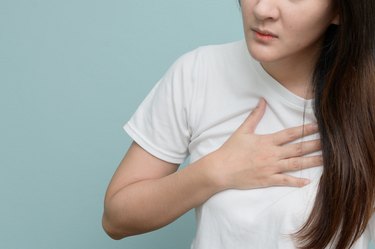
Acid reflux and high blood pressure often travel together as the two conditions share many risk factors, namely obesity and elements of a poor diet. Exactly how they're connected isn't quite clear, but managing both is essential.
Gastroesophageal reflux disease (GERD), a chronic version of what's commonly called acid reflux, occurs when stomach acid repeatedly flows back into the esophagus, causing heartburn or indigestion, according to the American Gastroenterological Association. GERD is more than a nuisance.
Video of the Day
Video of the Day
When it's not addressed, serious complications can develop, including severe chest pain, bleeding or a pre-cancerous change in the lining of the esophagus called Barrett's esophagus, warns the American College of Gastroenterology.
Read more: GERD: Its Signs and Symptoms
High blood pressure is also serious. A major risk factor for heart attacks and stroke, high blood pressure, known as hypertension, is called the silent killer because there usually are no obvious symptoms until it's too late.
George Bakris, MD, a professor of medicine and director of the American Heart Association Comprehensive Hypertension Center at the University of Chicago Medicine, points out that many people who have obesity have high blood pressure and take medications called calcium channel blockers to control it and lower their risk for heart attack and stroke. The problem? "Calcium channel blockers can make GERD worse," Dr. Bakris says. "It's important to treat both conditions."
GERD and Hypertension: Linked?
To try to assess how often the two conditions occur simultaneously, a small study published in the September 2018 issue of the Journal of Clinical Gastroenterology looked at a group of people with hypertension. It found that 44 percent also had GERD, and that reflux attacks and blood pressure spikes were connected. When they took proton-pump inhibitors (PPIs), a type of acid reflex drug that reduces stomach acids, both their GERD symptoms and blood pressure improved.
"In this study, GERD is associated with increased risk of high blood pressure, or hypertension, and blood pressure can actually improve with treatment of the acid reflux," explains William J. Bulsiewicz, MD, a gastroenterologist in Mount Pleasant, South Carolina, and author of the forthcoming book Fiber Fueled. "The question is 'why?'"
"At the moment, we don't have a clear answer, only theories," Dr. Bulsiewicz says. "One possibility is that acid reflux activates the sympathetic nervous system, which is essentially our adrenal system. When activated, our heart pumps faster and our blood vessels clamp down, leading to increased blood pressure," he explains.
"The other theory," he adds, "is that there is a common nerve connection in the brain that regulates both digestive function and cardiovascular reflexes, and therefore may lead to the co-existence of these issues."
What to Do
Still, this doesn't necessarily mean that all people with GERD and high blood pressure should take PPIs. "Unfortunately, there are risks to taking proton pump inhibitors that include vulnerability to infection, nutrient deficiencies, damage to the gut microbiome and small intestine bacterial overgrowth," Dr. Bulsiewicz explains. All benefits and risks must be weighed together with your doctor before making any medication decisions.
"There is certainly a role for acid-reducing medicine for the treatment of acid reflux," he adds. "It just shouldn't be our first line, given the potential risks."
Dr. Bulsiewicz suggests making changes to your diet and lifestyle first. "A plant-centered diet, fiber supplementation and elimination of caffeine and alcohol have all proven to be highly effective for acid reflux and may similarly benefit high blood pressure," he says.
Coffee and caffeinated beverages are among the culprits that can relax the lower esophageal sphincter between the stomach and the esophagus to the point that it doesn't close properly, allowing stomach acids to travel back up, according to the American Society for Gastrointestinal Endoscopy. The society offers these additional tips for reducing acid reflux:
- Avoid other GERD trigger foods such as chocolate, carbonated drinks, fatty, spicy or fried foods, tomatoes and citrus fruits and juices.
- Don't
lie down for two hours after eating or don't eat for at least two hours before
bedtime to lower the amount of stomach acid available for reflux.
It's also important to know your blood pressure numbers and talk to your doctor about steps to lower them if you're in or near the danger zone, the American Heart Association advises.
Read more: The Do's and Don'ts of Eating With GERD
- American Gastroenterological Association: “Gastroesophageal Reflux Disease (GERD)”
- American College of Gastroenterology: “Acid Reflux”
- American Heart Association: “What Is High Blood Pressure?”
- George Bakris, MD, professor of medicine, director, American Heart Association Comprehensive Hypertension Center, University of Chicago Medicine, Chicago
- Journal of Clinical Gastroenterology: “The Role of Gastroesophageal Reflux in Provoking High Blood Pressure Episodes in Patients with Hypertension”
- William J. Bulsiewicz, MD, gastroenterologist, Mount Pleasant, South Carolina, and author, "Fiber Fueled"
- American Society for Gastrointestinal Endoscopy: “Diet & GERD”
Is this an emergency? If you are experiencing serious medical symptoms, please see the National Library of Medicine’s list of signs you need emergency medical attention or call 911.